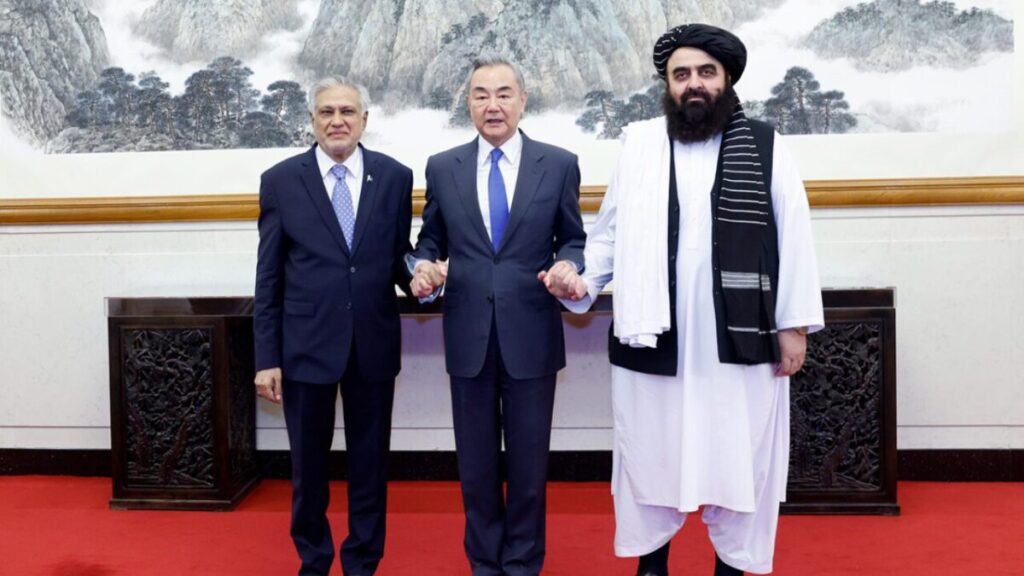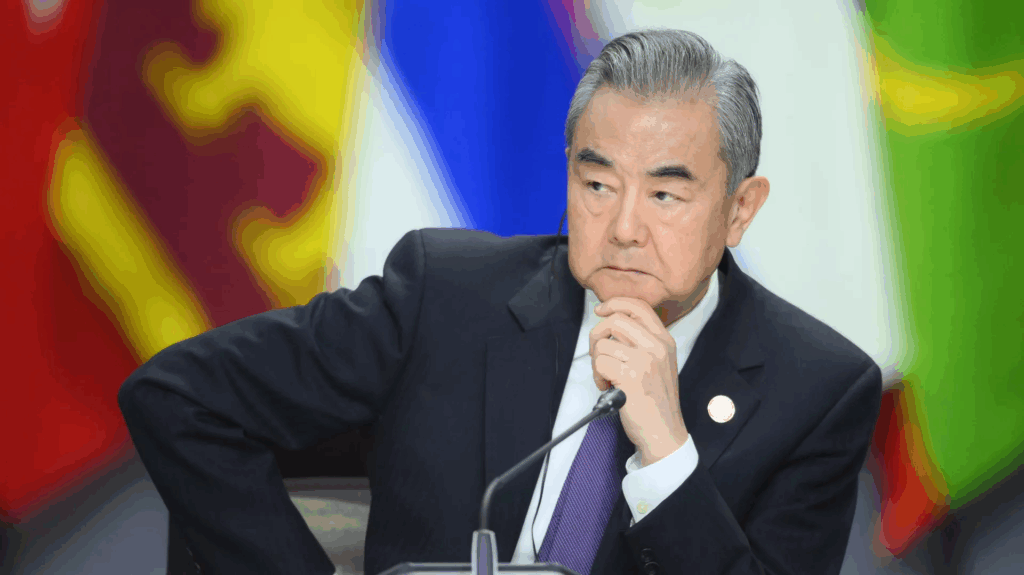Review of Afghanistan developments
Following the Taliban’s return to power, the enduring relationship between Pakistan and the Taliban has been influenced by various factors, resulting in a significant decline in relations between the two former allies over the past three and a half years.
In the past few months, both countries have made efforts to foster mutual trust, which may be seen as indications of enhancing relations between the two adjacent countries.
Following the tripartite meeting held on the 11th of May between representatives from China, Pakistan, and the Taliban in Kabul, a subsequent tripartite meeting at the ministerial level involving the foreign ministers of China, Pakistan, and the Taliban government took place in Beijing on the previous Wednesday (the 21st of May).
During a collaborative meeting involving Maulvi Amir Khan Muttaqi, the Foreign Minister of the Taliban government, and Ishaq Dar, the Foreign Minister of Pakistan, facilitated by Chinese Foreign Minister Wang Yi, an accord was established regarding cooperative actions aimed at enhancing the relationship between Pakistan and the Taliban.
The reestablishment of diplomatic ties between Pakistan and the Taliban administration through the exchange of ambassadors, the declaration of China’s involvement in the Trans-Afghan Railway initiative, the extension of the China-Pakistan Economic Corridor into Afghanistan, trilateral security collaboration, and China’s commitment to assist in infrastructure development and feasibility assessments for oil and gas projects in Afghanistan, constitute some of the trilateral agreements that have the potential to enhance the scope of relations and cooperation between Pakistan and the Taliban. Specifically, these agreements can fortify security and economic ties between Pakistan and the Taliban.
Possible results of enhancing relations between Pakistan and the Taliban
The recent initiatives undertaken by Pakistan and the Taliban government to foster mutual trust between the two neighboring nations, facilitated by China, are noteworthy in their own right. Nevertheless, one must consider the extent to which these bilateral endeavors can yield positive outcomes and future prospects.
The recent initiatives undertaken by Pakistan and the Taliban government to foster mutual trust between the two neighboring nations, facilitated by China, are noteworthy in their own right. Nonetheless, the question arises as to how significantly these bilateral actions can yield positive impacts and prospects.
It should be noted in response that countries such as Pakistan and Afghanistan, which have experienced prolonged tension and deterioration in their bilateral relations, require a strong commitment to demonstrate goodwill above all else, in order to establish peaceful relations based on that foundation.
From this viewpoint, the recent actions and agreements made between Pakistan and the Taliban in Beijing can be interpreted as indications of the goodwill shared by both countries to resolve previous tensions.
Enhancing mutual goodwill and transitioning from historical tensions to the establishment of good neighborliness in the political relations between Pakistan and Afghanistan represents a crucial advancement that has remained nearly elusive over the past fifty years.
Should the bilateral agreements between officials from Pakistan and the Taliban effectively prompt Islamabad to reassess the procedures concerning Afghan refugees departing from Pakistan, enhance cooperation regarding transit facilities between Afghanistan and Pakistan, and alleviate security tensions in regions on both sides of the Afghanistan-Pakistan border, these agreements could gradually transform the historically strained relations between Pakistan and the Taliban. By fostering mutual trust, they may establish the principle of good neighborliness as a guiding factor in their future interactions. The forthcoming passage of time will inevitably test this potential and the associated expectations.

Threatening factors in Pakistan-Taliban relations
Although Pakistan and the Taliban have shown a willingness to enhance their relationship, it seems that the primary factors contributing to the challenges persist unchanged.
An analysis of the progress made in the relationship between Pakistan and Afghanistan over the last fifty years has demonstrated that unless the underlying issues jeopardizing their relations are addressed realistically, strategic actions will not result in a lasting solution to the ongoing tensions between the two countries.
The dynamics of Afghanistan’s relationship with India, along with India’s reaction to the influences exerted by Pakistan and China in Afghanistan, the ongoing border conflict between Afghanistan and Pakistan, and the strategic maneuvers employed by Pakistan within Afghanistan’s geopolitical landscape amid the rivalry of major powers, constitute three critical elements that jeopardize the establishment of peaceful and amicable relations between Afghanistan and Pakistan.
The three factors contributing to the crisis have not been effectively addressed in the diplomatic relations and discussions between Afghanistan and Pakistan.
These three elements are interrelated and significantly influence the developments occurring in Afghanistan and its neighboring regions. Their separation has resulted in the breakdown of dialogue and the conflict resolution process in these relations.
This explains why China’s abrupt involvement in facilitating the restoration of relations between Pakistan and The Taliabn, following the discussions held by the Indian Foreign Minister with the Taliban government, along with China’s declaration to expand the China-Pakistan Economic Corridor (CPEC) into Afghan territory and its investment in the Trans-Afghan project, renders the prospects of these initiatives and the future of Afghanistan-Taliban relations ambiguous.
Without a fundamental resolution of the tensions between Pakistan and Afghanistan, the execution of the China-Pakistan Economic Corridor project through the contested Jammu and Kashmir region of India and Pakistan, along with its extension into Afghan territory, remains highly uncertain. Similarly, the enduring conflicts between Pakistan and Afghanistan have thus far obstructed the realization of significant regional projects connecting Central and South Asian countries through Afghanistan.
- On the other hand, if Pakistan’s stance towards Afghanistan remains unchanged, the Taliban government might continue to support Pakistani opposition groups like the Tehreek-e-Taliban Pakistan (TTP) as a means of deterring Pakistan. This strategy, consequently, prompts Pakistan to pursue a comparable approach, as it has been reported that the Pakistani government has initiated its relations with the new Trump administration by emphasizing its efforts against ISIS-Khorasan (ISKP), While the Taliban government claims that ISIS Khorasan is taking refuge in Balochistan, Pakistan.
Related Articles:
The Ups and Downs of Pakistan-Taliban Relations
Pakistan’s New Tools for Strategic Depth Policy in Afghanistan
Conclusion
In order to address the existing tensions between Pakistan and the Taliban government, and to more generally eliminate the underlying factors contributing to the strain in Pakistan-Afghanistan relations, it is crucial to involve a third party that can serve as a mediator, facilitating reconciliation and conflict resolution. Furthermore, following the reconciliation process, the involvement of an additional party as an observer and guarantor for the enforcement of the agreements is also vital.
An examination of the various aspects of the conflict and tension involving Pakistan and the Taliban, as well as the regional context, indicates that China cannot solely act as a mediator in addressing the issues between Pakistan and the Taliban. This is due to the fact that the challenges between Afghanistan and Pakistan represent a more extensive problem that must be viewed as part of the regional challenge.
Besides, the execution of large-scale regional initiatives like the China-Pakistan Economic Corridor (CPEC) and the Trans-Afghanistan project, which seek to shift the focus of relations from security to economic interests, appears improbable without a mutual agreement and cooperation between the two competing powers in the region, namely China and India. In this context, Afghanistan’s foreign policy, which is oriented towards economic priorities, will also encounter undesirable impasses.
Therefore, it is essential to effectively utilize China’s initial endeavors to mend relations and alleviate tensions between Pakistan and the Taliban. In the subsequent phases of this process, mediation and the assurance of resolving tensions between the two nations should transition from being the responsibility of a single country to adopting a regional framework and format.

















